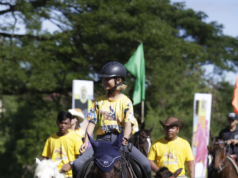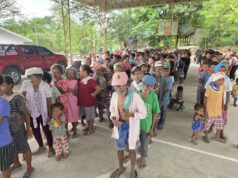CLARK FREEPORT – A 10-hectare water theme park is now under construction here even as the World Wide Fund for Nature (WWF) and its corporate social responsibility arm the Bank of the Philippine Islands (BPI) urged local folk to prepare for the effects of climate change during a forum only last month in nearby Angeles City.
Campaigners of the Philippine WWF were at the Clark Freeport last month to help map out a “climate- defined” future for local business amid climate change that has made unusual weather worldwide the new norm.
But even as this developed, the flourishing of the water parks and golf courses here has remained unabated resulting to water rationing in nearby communities especially in Barangay Sapang Bato, Angeles City which is located just outside the southwest perimeter fence of this freeport. This freeport hosts three golf courses – Mimosa Golf, FA Korean CC which is a joint venture between Fontana Leisure and Development Corp. and the Jimei Group with Korean developers, Apollo Development Corp., and the Philippine Air Force golf course.
This freeport is also host to the Fontana water park among others. The proliferation of these so-called “water- guzzlers” in a watershed area has been denounced by environmentalists. Yet, another potential“water-logger” has been approved to locate.
Last October 5, Clark executives and government officials broke ground for the construction of the Clark Valley View Leisure and Resort under the BB International Leisure and Resort Development Corp. (BBI).
Irineo “Bong” Alvaro,president of BBI, saidwater theme park is part of BB International’s P2.5-billion investment in Clark and will cover 10 hectares of a 120-hectare property it had leased from the state firm Clark Development Corp. (CDC) which manages this freeport.
The project is located along the rolling hills of Clark’s Gate 14 or particularly at its northwest section in Sitio Haduan which encroaches on the ancestral domain of the indigenous Aeta communities in the area. It is expected to be completed in the next three years.
Water rationing Last May, the establishment of the Deca Clark Wakeboard Park (DCWP) in Barangay Margot, which is adjacent to Barangay Sapang Bato, earned the ire of Angeles City Mayor Edgardo Pamintuan who feared that the project have impacted negatively on the nearby communities.
Nearby Barangay Sapang Bato has begun rationing its potable water to only two hours daily in the wake of an acute shortage of water supply from the aquifers. DCWP has put up a man-made lake in a landlocked barangay located on a mountainous terrain which could have affected the areas water supply, said the mayor.
Pamintuan had said that he got a call from a barangay official of Sapang Bato and was told of the acute water shortage in his village. He said he immediately called up Angeles City Water District (ACWD) General Manager Reynaldo Liwanag who confirmed the water shortage.
The wakeboard park and its man-made lake now threaten the aquifers, Pamintuan has said. He added that he was taken aback when he was told by the park operators that they got the water for the manmade lake from the rain.
“It’s rainwater according to them!” said a flabbergasted Pamintuan. Mabalacat City Water District director Diosdado “Deng” Pangilinan also said he will move for an investigation of the DCWP.
“We all know that Barangays Margot and Sapang Bato fall within the watershed areas of Clark which is the source of potable water of all the contingent communities,” said Pangilinan. “Hence, we all have a stake in its conservation,” he added.
Pangilinan, vigilant at any perceived threat to water supply and conservation, has not made any statement though on the BBI water theme project.
Meanwhile, the WWF said the call to mitigate the effects of climate change has never been more pronounced than now.
Jose Ma. Lorenzo Tan, chief executive officer of the WWF Philippines, has urge communities to consider developing multi-water sources, such as surface waters or rainwater impounding projects, and veer away from pumping from aquifers or underground water which, he stressed, has been blamed for subsidence or lowering of ground level and thus makes areas more prone to flooding.
The forum was WWF’s third and last phase of “business risk assessment and the management of climate change impacts project” that would cover 14 cities in the country. He noted that the WWF study now being conducted in Angeles City would draw up opportunities for the city to cope with the adverse effects of climate change in the next 20 to 30 years.




